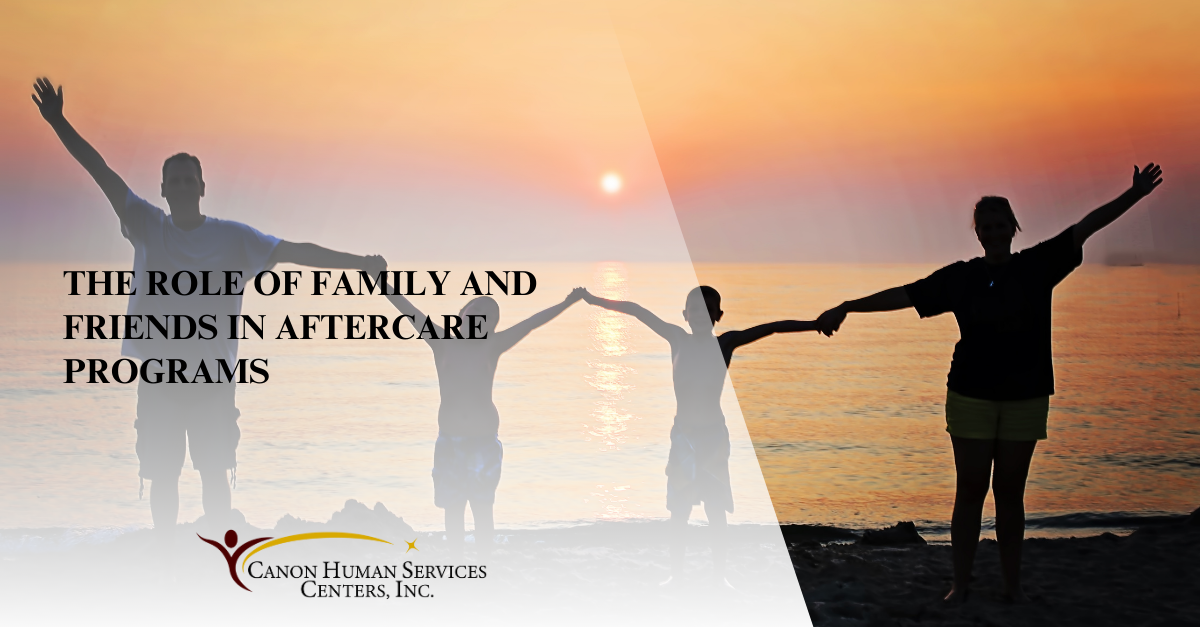Recovering from addiction takes more than completing a treatment program; it requires ongoing support, patience, and a solid aftercare plan. Family and friends play a crucial role in this transition phase, offering emotional backing, practical assistance, and accountability to ensure long-term recovery success. At Canon Human Services, we believe breaking down misconceptions and involving loved ones can pave the way for lasting recovery.
Whether you’re a rehab professional, a family member, or a recovering individual, you’ll gain valuable strategies and insights to foster recovery and resilience.
Why Aftercare Programs Are Essential
Before diving into the role of loved ones, it’s important to understand the significance of aftercare programs. These structured plans aim to support individuals as they transition from a treatment facility back into their daily lives. Aftercare programs often include counseling, support group meetings, relapse prevention strategies, and life-skills training.
However, the transition is not without challenges. Post-treatment life can feel overwhelming, with triggers, cravings, and adjustments to a new routine often posing significant risks. This is where families and friends become indispensable, serving as pillars of strength during this vulnerable yet empowering phase.
The Emotional Role of Family and Friends in Aftercare
Offering unconditional support is one of the most significant ways loved ones can help during recovery. The journey includes both progress and setbacks, yet consistent encouragement reassures the individual that they are not alone. Being actively present at key milestones, such as sobriety anniversaries or support group sessions, demonstrates commitment. Listening without judgment is critical, as sometimes all a recovering individual needs is someone to hear them out. Celebrating small wins along the way can also have a positive impact, as acknowledging efforts and progress provides valuable reinforcement.
Rebuilding trust is another vital element of aftercare, especially since addiction often strains relationships. This process demands honest communication, the establishment of healthy boundaries, and following through on commitments. Family therapy sessions, frequently integrated into aftercare programs, can play a significant role in fostering mutual understanding and healing.
It is also important for family and friends to recognize and understand emotional triggers, such as arguments, stress, or environments linked to substance use. Educating themselves about these triggers enables them to create a supportive atmosphere that promotes sobriety and reduces the risk of relapse.
Practical Ways Loved Ones Can Provide Support
Encouraging the individual to stick to their aftercare plan is one of the simplest yet most impactful ways to help. This includes attending therapy sessions, group meetings, and other activities outlined in their recovery plan. Offering to drive them to appointments or meetings, participating in family-focused counseling sessions, or gently reminding them of the importance of attending these appointments without being overbearing can foster engagement.
Routine is vital in reducing uncertainty and promoting a sense of control. Loved ones can assist individuals in reestablishing structure in their daily lives by encouraging a consistent sleep schedule, aiding with meal planning and preparation of nutritious food, and supporting engagement in hobbies, exercise, or other activities that align with their interests. Additionally, accountability partners who gently but firmly hold individuals accountable for their recovery milestones can play an instrumental role in preventing relapse.
Excessive stress is a significant relapse trigger, so loved ones should aim to minimize stress wherever possible. This might include assisting with childcare or household responsibilities while the individual adjusts, helping manage financial obligations to avoid overwhelming debt or pressure, and fostering open communication so concerns can be expressed before they escalate.
Lastly, being educated about relapse prevention is a practical way to support recovery. Understanding the signs of relapse, such as emotional withdrawal, irritability, or abandoning their recovery plan, can allow family and friends to intervene early and encourage the individual to seek support.
Community and Connection in Aftercare
Building a Network of Support
Recovery thrives in community. Encouraging the individual to engage in peer support groups like AA or NA ensures they feel connected to others with shared experiences. Additionally, when loved ones attend “open meetings” or similar opportunities, it demonstrates solidarity and reinforces the importance of these connections.
Encouraging Healthy Socialization
Isolation can often breed relapse, so investing in relationships and healthy socialization is important. Friends and family play a key role in reestablishing trust in social settings and introducing new sober-friendly activities, such as hiking, cooking classes, or creative arts workshops.
Balancing Support With Independence
While support is vital, it’s equally important to strike a balance that doesn’t foster dependency. Allow the individual to regain independence by making their own decisions and taking ownership of their recovery plan while knowing you’ll be there if needed. Celebrate this autonomy as a victory in their recovery.
Breaking Misconceptions About Recovery and Aftercare
One of the biggest barriers to effective involvement by family and friends is the myths surrounding recovery. Misconceptions such as “The work is done after rehab” or “Relapse means failure” can undermine the process. At Canon Human Services, we encourage family members to educate themselves by attending workshops, reading credible resources, or consulting with rehab professionals to better understand the realities of addiction and recovery.
Clearing these misconceptions fosters a culture of empathy and patience, which can make all the difference in an individual’s aftercare success.
Work With Canon Human Services for Effective Aftercare
Recovery is a team effort supported by experts, loved ones, and the recovering individual themselves. Canon Human Services is committed to guiding families and individuals through this transition phase, providing education, counseling, and resources to ensure successful reintegration into daily life.
For those navigating recovery, remember this:
Together, you can build a stronger foundation for the future, and every small step forward matters.
Looking for guidance on how you can better support a loved one in recovery? Reach out to Canon Human Services today to learn more about our aftercare and family therapy programs.

